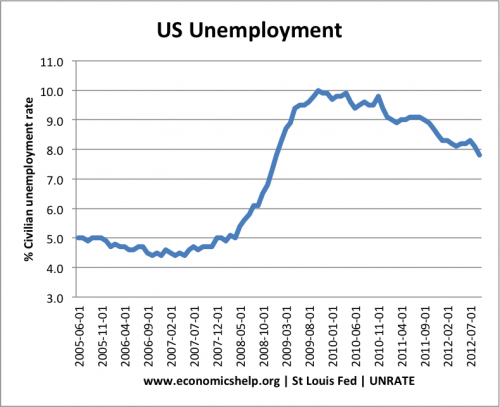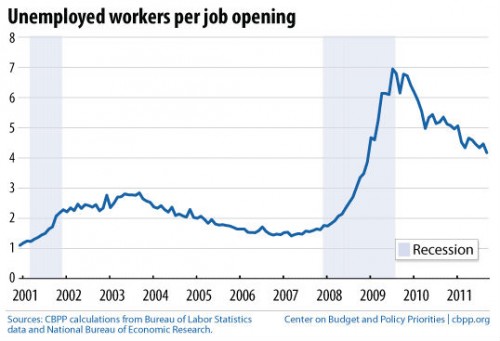Casey B. Mulligan, from the University of Chicago suggests a theory for a major cause of the great recession and the rise in US unemployment post 2008. – Higher welfare payments.
..Redistribution, or subsidies and regulations intended to help the poor, unemployed, and financially distressed, have changed in many ways since the onset of the recent financial crisis. The unemployed, for instance, can collect benefits longer and can receive bonuses, health subsidies, and tax deductions, and millions more people have became eligible for food stamps.
Economist Casey B. Mulligan argues that while many of these changes were intended to help people endure economic events and boost the economy, they had the unintended consequence of deepening-if not causing-the recession.
The Redistribution Recession – Oxford University Press

There is also an article here at the NY Times (paywall): A Keynesian Blind Spot.
The decline of home construction is not the primary reason that our labor market remains depressed: Keynesian policies are
…
In my new book, I explain how, in the matter of a few quarters of 2008 and 2009, new federal and state laws greatly enhanced the help given to the poor and unemployed — from expansion of food-stamp eligibility to enlargement of food-stamp benefits to payment of unemployment bonuses — sharply eroding (and, in some cases, fully eliminating) the incentives for workers to seek and retain jobs, and for employers to create jobs or avoid layoffs.
Economists normally think that eroding incentives (as they call it, raising marginal labor income tax rates) depresses the labor market rather than expanding it, and that it would be tough for the labor market to get back to its 2007 form without returning incentives to what they were back then.
Yet Professor Krugman asserts that he would end this depression now with an even bigger stimulus — with more help for the poor and unemployed — that would further erode incentives and further penalize success.
Essentially Mulligan argues:
- The increase in welfare payments in 2008/09 discouraged people from working, contributing to the rise in unemployment and recession.
- Keynesian economics suggests giving bigger government stimulus (i.e. higher welfare payments) but this would just increase the incentive to avoid work and make the recession worse.
Evaluation of the Redistribution Recession Argument
- Whilst in theory, increasing welfare payments can create a disincentive to work, the US sees a large gap between job vacancies and those actively seeking work.

- Berkeley economist Jesse Rothstein, found that while the extension of UI indeed increased the unemployment rate by about 0.3 percent, the “vast majority” of unemployment was due to “demand shocks” not “UI-induced supply reductions.” link
- In a recent report, the Congressional Budget Office found that even if UI benefits convince some people to stay out of work, those job openings quickly get filled by new entrants into the labor market. Therefore, in a recession, unemployment benefits acts has an even smaller impact on unemployment than usual.
- Keynesian economics doesn’t necessarily involve increasing welfare payments. Classical Keynesian economics typically advocates capital investment to create demand and demand for jobs. Keynesian economics doesn’t advocate changing work incentives.
- However, increasing unemployment benefits can be a good way to increase aggregate demand because people on low incomes have a high marginal percentage to consume
- The idea that higher welfare payments caused higher unemployment, ignores the impact of reducing welfare payments in Europe. For example, Spain has cut unemployment benefits, but has still seen a rise in unemployment close to 25% (link)
- In Greece, unemployment benefit has been cut to 350 euros (£273; $431) per month, but only those who have up-to-date national insurance contributions are eligible; and even then it only lasts for one year. (link)
Conclusion
There is nothing wrong with the basic idea that higher unemployment benefits can cause some disincentives to take a job. However, it is particularly unconvincing at the start of a recession – when there is a rapid rise in unemployment, a rise in long-term unemployment and increase in number of applicants to job vacancies. The rapid growth in US unemployment (and in other countries) was not caused by a sudden increase in the number of people refusing to work because benefits were so generous. The rapid rise in unemployment was closely correlated to the precipitous fall in GDP and demand for goods and services.
Also, on a personal note, I’m really not convinced that US welfare payments would encourage people to stay unemployed. It is less than even the minimum wage and makes existence a real scrape. Extending unemployment insurance from 26 weeks to 99 weeks helped avoid relative poverty during a period of mass unemployment. (BBC link)
Related
